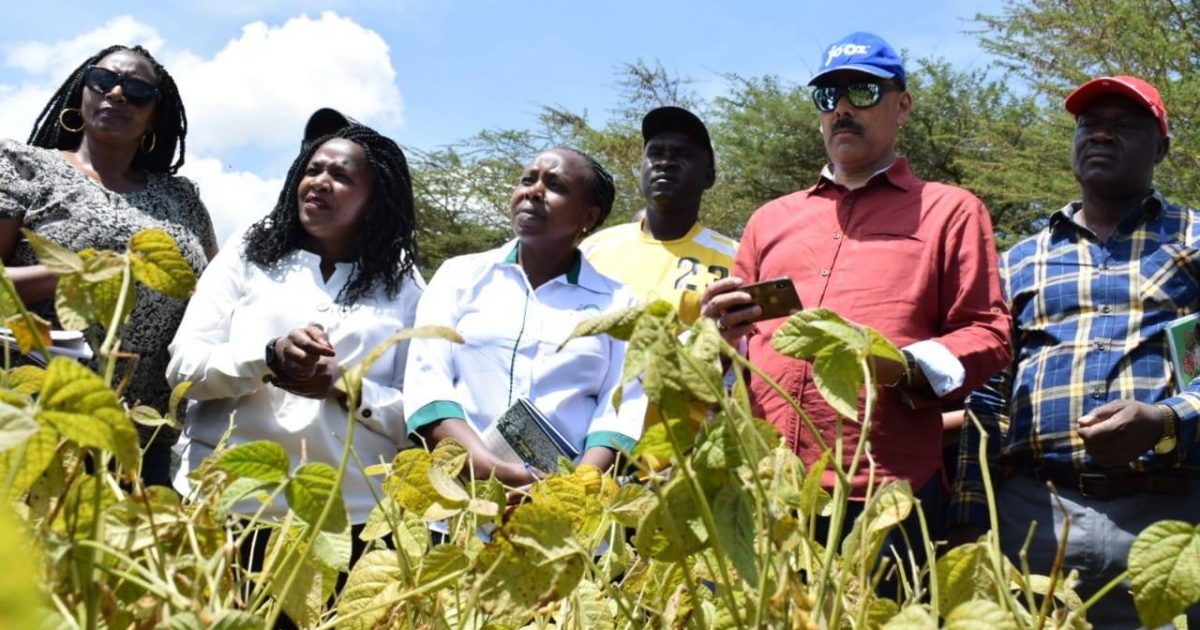The Nakuru County government has unveiled a Food Safety Coordinating Committee tasked with ensuring fruits, vegetables and herbs meant for local consumption were as safe as those destined for export.
The County Executive Committee Member for Agriculture and Fisheries, Immaculate Maina noted that the country is registering rising cases of food-related diseases owing to poor handling, driven by loopholes in the food value chain.
Speaking during a meeting with farmers on the progress of food safety in Kenya organised by her department jointly with Horticulture Crops Directorate’s – Agriculture Food Authority (AFA), Dr. Maina said the devolved unit was making major strides in ensuring production of safe food.
“We are stepping up food safety through strengthening the capacity of aquaculture, horticulture and dairy value chain actors on sanitary and phytosanitary standards. We are inspiring action to help prevent, detect and manage food borne risks,” she said.
“Public Health enforcement of food safety standards is ongoing with hoteliers and street food vendors to ensure the standards are adhered to. Consumers are being sensitised and encouraged to demand for safe food to ensure the reduction of food borne diseases and other diseases associated with food safety,” stated Dr. Maina.
Consumption of unsafe food has been linked to health concerns like food poisoning or intoxication, allergic reactions, stunted growth in children, diseases related to heart among others.
Dr. Maina said the devolved unit was in the process of establishing a clean horticultural hub where farmers are trained on proper agricultural practices that preserve quality of food from production, handling, processing, preparation and marketing to prevent contamination and food-borne illnesses.
“Certainly, we must rise above consuming food products without asking the hard questions on their safety. As a country, we need to prioritise our health, which is our wealth,” she noted.
“As one of Kenya’s food baskets, Nakuru is keen to produce safe food for human consumption and wholesome and harmless animal feeds. We are working on a system of food handlers’ association while banking on personal responsibility to ensure food safety,” observed the CEC.
The Agriculture Food Authority (AFA) Compliance and Regulatory Services Manager, Josephine Simiyu expressed concern that the bulk of food consumed locally was unsafe since no one checks the quality before it reaches markets unlike with export produce.
She noted that food destined for export was produced under the Global GAP guidelines and producers strived to comply with the rules to get competitive advantage in the market.
“There are a lot of challenges in production of food for local consumption ranging from unregulated urban and peri-urban food production, consumers’ unwillingness to pay for premium quality produce and choice of quantity over safe food among others,” she noted.
“For local market, various experts have established that not all food is safe and one of the major issues that lack is traceability, which can help consumers and authorities look at how safety issues are implemented in the entire chain,” said Ms. Simiyu.
According to the World Health Organization (WHO), approximately 91 million people in Africa fall ill annually from consuming contaminated food and 137,000 die as a result.
The global health agency stresses the need to adopt food control systems to meet changing needs for better protection of public health.
Separately, an expert in Sustainable Agriculture at Egerton University and a Board Member of Organic Consumers Alliance (OCA), Prof. Rhoda Jerop Birech has observed that most farmers were using some insecticides, herbicides and pesticides known to contain elements deemed unsafe to humans as well as animals while most herbicides contained glyphosate as the active ingredient which has been cited as a probable carcinogenic to humans.
Prof. Birech noted that besides contributing significantly to unsafe food, excessive use of agrochemicals also polluted water sources through surface run-off.
She suggested that food safety regulating bodies and the private sector needed to work together and be well-funded to engage in long-term activities committed to sustain and improve food safety.
“Food security exists when everyone gets access to adequate, safe and nutritious food which meets their daily dietary needs. We must bring food safety sanity in areas of input supplies, quality of water at production sites, harvesting, handling, parasites and disease control and interrelated activities to phase out possible contaminations,” noted Prof. Birech.
“Unregulated and excessive use of inorganic fertilizers and other agrochemicals have led to degradation of land and consequently, affected quality of food produced,” she noted.
The national government has announced plans to establish a specialised agency to ensure safety of farm produce on sale in the local market, amid rising cases of food contamination.
The agency will particularly be tasked with checking the quality of farm produce and levels of harmful chemical residues in goods offered for sale by mama mbogas (vegetable vendors) and other outlets.
The Crops and Agriculture Principal Secretary, Hamadi Boga said the ministries of Agriculture and Health were putting in place a food safety agency to address growing consumer concerns about food safety and ensure produce meant for local consumption were as safe as those destined for export.
By Anne Mwale/Elmad Ogara



